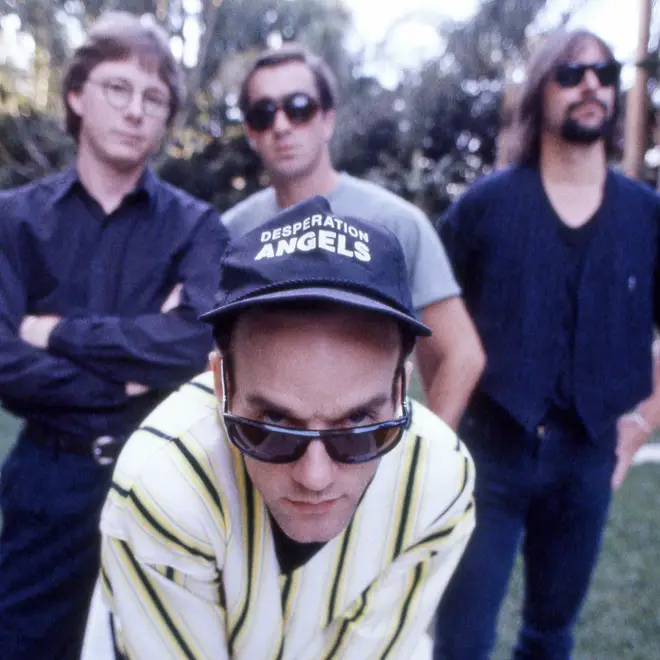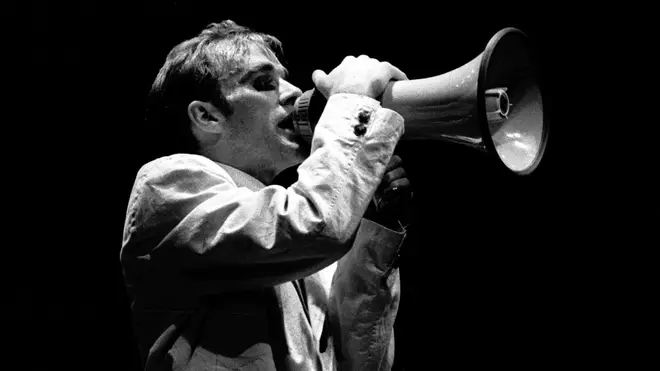On Air Now
The Chris Moyles Show 6:30am - 10am
11 March 2024, 14:53

In March 1991, the US band released Out Of Time - but they weren't convinced the album would sell.
"I think it really is, for 1991, a pretty peculiar record in the context of pop music right now."
It's hard to imagine R.E.M's Out Of Time being considered a "difficult" album. But 30 years ago, Michael Stipe thought that the band's seventh full-length outing was something of a risky endeavour.
Three decades on, Out Of Time is seen as one of the US band's all-time classics. It spawned the monster hits Losing My Religion and Shiny Happy People and - more importantly - sold over 18 million copies around the world. This put R.E.M. into the league of stadium-filling acts.

But back in March 1991, frontman Stipe wasn't so certain that Out Of Time would be a success. Its predecessor, Green, had been the group's first release on the major label Warner Brothers three years earlier, consolidating R.E.M.'s status as America's greatest "cult" band. Out Of Time saw Peter Buck put down his guitar, pick up a mandolin and play along with a string section. This was a new direction.
"I don't think a lot of people are doing what we've done with this record," Stipe told the BBC's Rapido programme the week of Out Of Time's release. "So in a sense it's out of time, it's out of place, it's not really fitting in with what's going on in music right now. And I like that."

R.E.M. 1991-03-20 - ‘Rapido’, BBC, UK (Interviews & clips surrounding the release of ‘Out of Time’)
Formed in 1980, R.E.M. had created a catalogue of low-key but beautiful guitar pop, with the indistinct vocals of Michael Stipe prompting fans to endlessly reinterpret his lyrics. Both Green (1988) and Document (1987) were challenging, dark albums, discussing the conservative politics of the US, climate change, war and human rights.
Moving to Warner Bros was seen as a key moment for the group as they'd previously issued their music on the independent label IRS. Their final indie album, Document, had spawned the hits The One I Love and It's The End Of The World As We Know It (And I Feel Fine), while Green was a even bigger commercial success with tracks like Stand and Orange Crush.

R.E.M. - It's The End Of The World (Official Video)
As drummer Bill Berry recalled, Green's popularity gave the band more scope with Out Of Time: band members were swapping instruments and playing new ones, and there were additional musicians playing strings, saxophone, steel guitar and even a flugelhorn ("We wanted a french horn, but this is the next best thing," said Berry).
The biggest change was that from the outset, R.E.M. has said that they would not tour in support of Out Of Time - the album would stand alone as its own work of art. The decision was partly down to pure exhaustion as they'd toured most of the 1980s, but to bring along all the extra musicians would be problematic and expensive.

Bassist Mike Mills acknowledged that not playing live could harm the sales of Out Of Time: "It's a very distinct possibility that the fact that we won't tour means we won't sell as many, but we don't necessarily do the things we do to sell records, we try to keep ourselves happy."

R.E.M. - Losing My Religion (Official Music Video)
When R.E.M. released the first single from the album, all doubts that Out Of Time would be a flop quickly disappeared. Losing My Religion was a departure from the classic R.E.M. jangling guitar rock sound that had characterised their singles up to that point.
As Mike Mills says 30 years later: "It’s a five-minute song with no discernible chorus, and the mandolin is the lead instrument. There is absolutely no way to ever predict that that would be a hit. So, you just throw it out there."
Losing My Religion was accompanied by a striking music video directed by Tarsem Singh. He was inspired by a story by Gabriel García Márquez called A Very Old Man With Wings, in which an angel appears on Earth to much confusion. Some shots were inspired by the painter Caravaggio, others by Russian propaganda posters.
Singh didn't know how to tie the different elements together until he went clubbing with Michael Stipe. As he told Rolling Stone, "I saw him dance and I thought, 'That’s the missing element!'"

The major innovation in the Losing My Religion video was that Michael Stipe was seen to lip-sync to the soundtrack. R.E.M. had been making videos for years, but the sight of the band's frontman singing along was nowhere to be found, as Stipe hated the artificiality of the process. That is, until he saw the raw and honest clip for Sinead O'Connor's Nothing Compares 2 U.
But what of the lyrics to Losing My Religion? What do they mean? Michael Stipe has claimed that the words have been misinterpreted for years. He admitted that the overtly political lyrics of the previous two R.E.M. albums had been a concern.
"I wanted to move away from that so as not to pigeonhole myself as a political writer," he said. "In order to challenge myself I decided to write an album of love songs, which I've never done before." Losing My Religion is, according to Stipe, "a classic obsession song". He told Q magazine in 1992 that "It’s about someone who pines for someone else. It’s unrequited love, what have you."

R.E.M - Losing My Religion (Glastonbury 1999)
The title of the song and some of the imagery in the video caused some critics to wonder if Stipe was writing about religion. But the title was a typical reference to the Southern culture that the members of R.E.M. had grown up in, down in Athens, Georgia. "Losing my religion" is a Southern expression meaning "losing my rag" or "flying off the handle". To lose one's temper, basically.
Losing My Religion scaled to the heights of No 19 in the UK charts on its release at the end of February 1991. Their highest charting UK single until that point had been Orange Crush, which had just nudged into the Top 30 in the summer of 1989.
The power of the song has endured three decades and it quickly became a live favourite when R.E.M. returned to touring in 1995. Stipe described to American Songwriter in 2021 the effect the track had on an audience.
"You felt it before you saw it,” he says. “The energy coming off of an audience, a large audience in an outdoor arena, with the first notes, those first da, da, da, da, da and the place would just explode with energy...
"It was the biggest shot in the arm. The biggest jolt of adrenaline. The most powerful feeling that I think I’ve ever felt.”